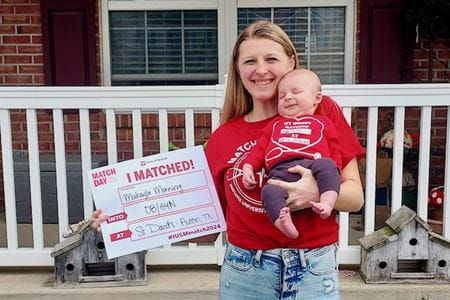Persistence pays when chasing a dream.
It took Makayla Morning four years to make it into medical school. Now she is among 47 first-generation students graduating from the Indiana University School of Medicine. Each of these students — the first in their families to graduate from college and medical school — overcame obstacles to get to Match Day. Now all of them are heading into residency training programs of their choosing throughout the United States.
Morning is preparing to move to Texas, where she will begin training as an obstetrician and gynecologist at St. David’s HealthCare Austin. Heading into Match Day, she felt nervous. As the oldest child in a family with two high school-educated parents, nothing about her educational journey had come easily.
“Opening the envelope and seeing my match was a huge relief, knowing I’m going to my No. 1 choice for residency,” said Morning, president of the IU School of Medicine Class of 2024.
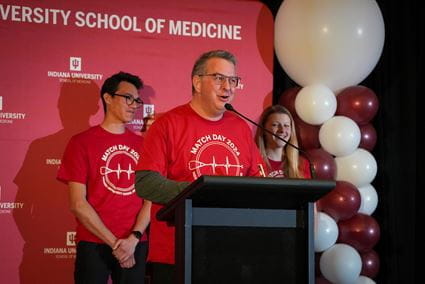 She was joined in celebration by her parents and her husband, Jordan, along with their new son, who turned 3 months old on Match Day. As an IU School of Medicine—Bloomington student, Morning completed away rotations in Indianapolis and Fort Wayne while pregnant. Then a serious medical complication led to early delivery by cesarean section, putting her medical school graduation in jeopardy.
She was joined in celebration by her parents and her husband, Jordan, along with their new son, who turned 3 months old on Match Day. As an IU School of Medicine—Bloomington student, Morning completed away rotations in Indianapolis and Fort Wayne while pregnant. Then a serious medical complication led to early delivery by cesarean section, putting her medical school graduation in jeopardy.
Ultimately, Morning did what she’s always done — kept going.
“At two-and-a-half weeks postpartum, I had to go into my radiology rotation every single morning,” she said. “I was anemic due to my surgery, and just walking to keep up with the provider was difficult.”
Morning persevered, just as she had for the four years after she graduated with her bachelor’s degree from IU — every time she got a medical school rejection letter. She always called the IU School of Medicine admissions office to ask what she could do to strengthen her application for the next cycle. After achieving admission, the struggles weren’t over. A highly involved student with the Medical Student Council and student interest groups for OB-GYN and correctional medicine, Morning faced academic challenges. When Step 1 of the medical licensing exam didn’t go as planned, she persevered again, embracing remediation to stay on track.
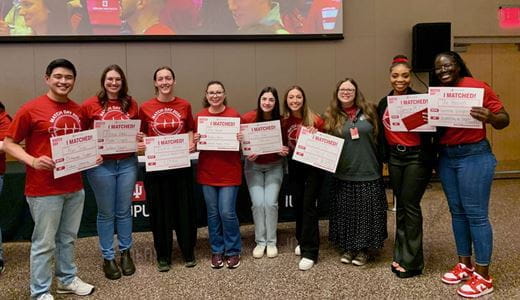 “All those voices you heard over the years saying you shouldn’t go into medicine start rising to the forefront and make you wonder, ‘Did I just waste years of my life?’” Morning said. “But you just keep going.”
“All those voices you heard over the years saying you shouldn’t go into medicine start rising to the forefront and make you wonder, ‘Did I just waste years of my life?’” Morning said. “But you just keep going.”
Now, as a future obstetrician and gynecologist, Morning holds her traumatic childbirth experience and the many other challenges she’s overcome as assets on the path to becoming a compassionate physician.
“First gen is being willing to take the path that looks different than everyone else’s, forging ahead when it feels like you can’t,” Morning said. “It’s having the strength to do what you — or more often, others — thought you couldn’t, and having grace for yourself when you struggle. Being first-gen is proof that dreams do come true.”
Celebrating first-gen success
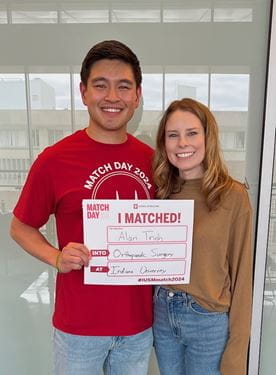 Alan Trinh, First Gen Committee & Wellness Coalition leader
Alan Trinh, First Gen Committee & Wellness Coalition leader
Specialty: Orthopedic Surgery
Location: Indiana University
Question: How do you feel about your residency match?
Answer: I am ecstatic beyond belief to have matched at my No. 1 program! IU is one of the best programs in the nation, and I’m happy to stay to train with many of the mentors that I have gained along the way.
Q: What challenges have you overcome to get to where you are today?
A: Navigating the complexity of medical school and college admission, retaking the MCAT, and re-applying to medical school were all challenges I faced and overcame through hard work and determination. Additionally, overcoming the internal doubt you have for yourself was a challenge that I had with each step along the way. Appreciating the small achievements helps build your confidence and make you feel like you belong in the field of medicine.
Q: What advice do you have for other first-gen medical students?
A: Get involved with different organizations and go into medical school with an open mind. Being involved helps you gain the exposure to pursue the specialty of your dreams. … Medical school will inevitably have hard days. Finding the people that you can depend on for social and emotional support is a way to keep yourself grounded and sane. I would not be where I am without my significant other, my family and my friends that I made along the way.
Aonesti Williams, First Gen Committee & Medical Student Council leader
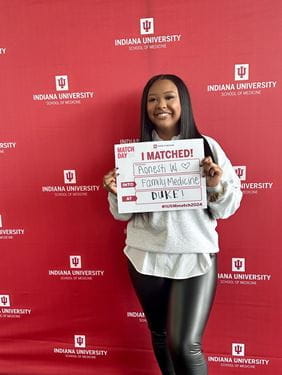 Specialty: Family Medicine
Specialty: Family Medicine
Location: Duke University
Q: What challenges have you overcome to get to where you are today?
A: Being a Black woman from a low-income family has always made things harder for me, but I did not let that stop me from pursuing my dreams. Overcoming systemic racism, financial struggles and imposter syndrome have made me resilient, and makes this achievement that much more meaningful. I am a proud first-generation college graduate and soon to be the first doctor in my family. It doesn't get any better than that!
Q: What are you most looking forward to in residency?
A: I am very excited to be starting my career at Duke! I love the versatility and flexibility of family medicine. I am looking forward to learning about how I can best serve my patients as a physician advocate and change maker in my community.
Q: What would you like to share about your time at IU School of Medicine?
A: I am grateful for all the challenges I faced and all the opportunities I obtained. Being involved in this community has not only showed me what type of physician I want to be, but it reinforced my values and reminded me of the person that I already am. Thank you, IU School of Medicine, for taking a chance on me!
Victoria Rone, First Gen Committee & Medical Student Council leader
Specialty: Obstetrics and gynecology
Location: University of Cincinnati
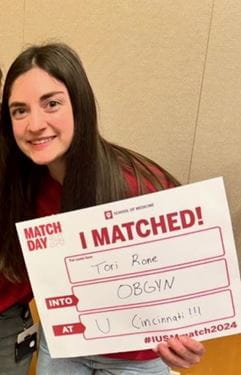 Q: Why did you choose your medical specialty?
Q: Why did you choose your medical specialty?
A: I began medical school thinking I wanted to do emergency medicine. Obstetrics was my first clinical rotation of third year, and I loved it. I love the patient interactions and longitudinal relationships, as well as the chaos of the labor and delivery floor. It’s the perfect mix of surgery, clinic, and building rapport with vulnerable populations.
Q: Where did you find support on your educational journey?
A: I have the most supportive friend group, hands down. Coming from a regional campus (Evansville), I really got to know my classmates, and I am extremely grateful for that. There was never any competition at our campus, so everyone cheers each other on. I also think the Department of Obstetrics and Gynecology is extremely involved with their applicants, so I’ve always had someone to answer my burning questions.
Q: What advice do you have for other first-gen medical students?
A: Learn to be resourceful and trust that you do belong in medical school. It is important to make connections with faculty and classmates because someone is always going to know something you don’t, and any extra information is useful. As a first-generation student, you will bring a lot of perspective and outside experiences to the table. Don’t be afraid to use that background to your advantage!
Kenneth Cox, IU School of Medicine—Muncie
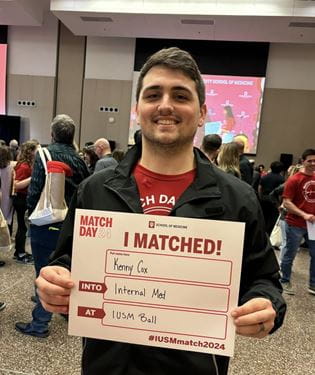 Specialty: Internal Medicine
Specialty: Internal Medicine
Location: IU Health Ball Memorial Hospital
Q: What does your first-gen identity mean to you?
A: I think the title of “first gen” has a connotation of hard work. Many of our classmates were following in the steps of their parents, but to go through this process blind takes a lot of patience and rolling with the punches.
Q: What challenges have you overcome to get to where you are today?
A: The biggest personal challenge was the lack of resources I had as a first-generation college student and first-generation medical student. It was a lot of using Reddit and just hoping that I was doing things correctly. I think it led to more neuroticism than necessary.
Q: How do you feel about your residency match?
A: I am very excited about my match! Ball Memorial was my top-choice program, and I am happy with the relationships I have already established at the hospital after spending all four years of medical school in Muncie. Internal medicine offers many opportunities to explore interests in multiple organ systems and become knowledgeable about any subspecialty.
Dominique Ketsoglou, Mentoring and Advising Program tutor
Specialty: Obstetrics and gynecology
Location: Northwell Health/South Shore University Hospital
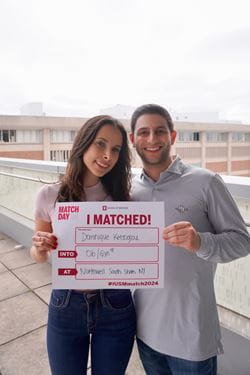 Q: When did you know you wanted to become a doctor?
Q: When did you know you wanted to become a doctor?
A: I conducted research in Kenya as an undergraduate student at the University of Florida, and I also rotated in Kenya through the AMPATH program at IU. I was introduced to the profound health care disparities seen in medically underserved areas, and I knew I wanted to be a part of addressing these issues and bridging gaps in health care, both globally and here in the United States.
Q: What does your first-gen identity mean to you?
A: I am proud to be a first-generation student. I am also Latina and come from a multicultural home. My unique background has allowed me to approach others with humility and compassion, and to better understand their perspectives. It has helped shape me into the person I am today.
Q: How do you feel about your residency match?
A: I grew up on Long Island. Matching at a program close to home was really important to me. I’m looking forward to starting residency in New York, where I will have my greatest support systems close by, and to meeting my co-residents and having the opportunity to positively impact patients in my home state.
